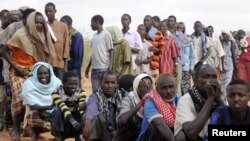NAIROBI —
Kenya has again ordered Somali refugees across the country to return to designated camps, following recent attacks and threats in the country attributed to Somali militants. The Somali community says the directive unfairly punishes innocent people.
On Wednesday, Kenyan Interior Minister Joseph Ole Lenku issued a statement ordering all refugees residing the country to return to camps in Dadaab and Kakuma. Any refugees caught violating the directive “will be dealt with in accordance with the law.”
The directive could affect tens of thousands of refugees living and working outside the camps.
They include Mohammed Mahamud Alasow, a taxi driver in Nairobi who came from Somalia 20 years ago.
“For Somalis like us,” he says, “who are in Kenya, especially in Nairobi and big towns, we see this as unjust and to repeat the same statement over and over again is something that doesnot comply with the law.”
Kenya's high court last year rejected a previous attempt by the government to force refugees back into camps, saying the order threatened the “rights and fundamental freedoms” of those living in urban areas.
A statement from Ole Lenku cites “emerging security challenges” as the reason for the new order.
On Sunday, gunmen opened fire at a church near Mombasa, killing six people and injuring many others. A week earlier, a load of explosives was discovered in a car parked outside police headquarters in the city.
The Somali militant group al-Shabab has taken responsibility for recent attacks in Kenya, including last year's siege on the Westgate shopping mall in Nairobi.
Hassan Guled, chairman of the Somali Business Community in Nairobi says most refugees are simply trying to make a living, and should not be treated like terrorists.
“One who is having a business in Nairobi or Mombasa and who is a serious businessman and who ekes his living from here I do not think will support terrorism,” said Guled. “The terrorists we see are young people who are confused and who are sent to come and do bad things.”
Kenya has played host to hundreds of thousands of refugees from Somalia in its Dadaab and Kakuma camps, which opened in the early 1990s. But insecurity has remained a challenge in the camps, with occasional attacks on aid workers and government personnel blamed on Somali militants.
On Wednesday, Kenyan Interior Minister Joseph Ole Lenku issued a statement ordering all refugees residing the country to return to camps in Dadaab and Kakuma. Any refugees caught violating the directive “will be dealt with in accordance with the law.”
The directive could affect tens of thousands of refugees living and working outside the camps.
They include Mohammed Mahamud Alasow, a taxi driver in Nairobi who came from Somalia 20 years ago.
“For Somalis like us,” he says, “who are in Kenya, especially in Nairobi and big towns, we see this as unjust and to repeat the same statement over and over again is something that doesnot comply with the law.”
Kenya's high court last year rejected a previous attempt by the government to force refugees back into camps, saying the order threatened the “rights and fundamental freedoms” of those living in urban areas.
A statement from Ole Lenku cites “emerging security challenges” as the reason for the new order.
On Sunday, gunmen opened fire at a church near Mombasa, killing six people and injuring many others. A week earlier, a load of explosives was discovered in a car parked outside police headquarters in the city.
The Somali militant group al-Shabab has taken responsibility for recent attacks in Kenya, including last year's siege on the Westgate shopping mall in Nairobi.
Hassan Guled, chairman of the Somali Business Community in Nairobi says most refugees are simply trying to make a living, and should not be treated like terrorists.
“One who is having a business in Nairobi or Mombasa and who is a serious businessman and who ekes his living from here I do not think will support terrorism,” said Guled. “The terrorists we see are young people who are confused and who are sent to come and do bad things.”
Kenya has played host to hundreds of thousands of refugees from Somalia in its Dadaab and Kakuma camps, which opened in the early 1990s. But insecurity has remained a challenge in the camps, with occasional attacks on aid workers and government personnel blamed on Somali militants.




